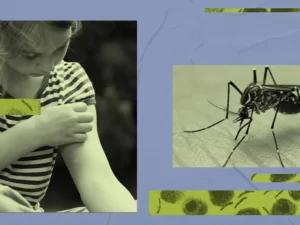Dengue
Dengue is a viral infection transmitted by the Aedes mosquito. It is widespread in tropical and subtropical regions of the world, and is a major public health concern in many countries. The virus that causes dengue is a single-stranded RNA virus, and there are four different serotypes of the virus (DEN-1, DEN-2, DEN-3, and DEN-4).
Symptoms of dengue typically include fever, headache, muscle and joint pain, and a rash. In some cases, the infection can progress to a severe form of the disease known as dengue hemorrhagic fever, which can be fatal.
There is no specific treatment for dengue, and management usually involves supportive care to relieve symptoms. Prevention efforts focus on reducing mosquito populations and avoiding mosquito bites through the use of mosquito repellents, protective clothing, and mosquito nets. There is also a vaccine available for dengue, which has been approved in several countries.

Symptoms –
The symptoms of it can vary depending on the severity of the infection. Some people may not have any symptoms at all, while others may experience mild to severe symptoms. Here are some common symptoms of dengue:
- High fever (typically lasting 2-7 days)
- Severe headache, often behind the eyes
- Pain in the muscles and joints
- Nausea and vomiting
- Rash, which may appear two to five days after the onset of fever
- Mild bleeding from the nose or gums
- Fatigue or weakness
- Swollen lymph nodes
In some cases, it can progress to a severe form of the disease known as dengue hemorrhagic fever, which can be life-threatening. Symptoms of severe it can include:
- Severe abdominal pain
- Persistent vomiting
- Bleeding from the nose or gums
- Blood in the urine, stool, or vomit
- Restlessness or irritability
- Difficulty breathing
- Cold, clammy skin
- Low blood pressure
If you suspect that you or someone you know may have dengue, it’s important to seek medical attention right away.
Causes –
it fever is caused by the dengue virus, which is transmitted to humans by the bite of infected Aedes mosquitoes. There are four different serotypes of the iti virus, DEN-1, DEN-2, DEN-3, and DEN-4. Once a person is infected with one serotype, they develop immunity to that specific serotype but remain susceptible to infection with the other three serotypes.
The it virus is typically found in tropical and subtropical regions of the world, where the Aedes mosquito thrives. Mosquitoes become infected with the virus when they feed on the blood of a person who is already infected with the virus. The virus then replicates in the mosquito’s body and can be transmitted to another person when the infected mosquito bites them.

Dengue fever cannot be transmitted from person to person, except in rare cases through blood transfusions or organ transplants. Pregnant women can also transmit the virus to their newborn during delivery, but this is also rare.
Preventing the spread of dengue involves controlling the mosquito population through measures such as eliminating standing water where mosquitoes breed, using insecticides and mosquito repellents, and using mosquito nets to protect against bites. There is also a dengue vaccine available in some countries.
Types –
There are four different serotypes of the dengue virus, which are DEN-1, DEN-2, DEN-3, and DEN-4. Each serotype is distinct and can cause illness in humans.
Primary infection with one serotype of the it virus typically results in lifelong immunity to that specific serotype, but not to the other serotypes. In some cases, a person who has previously been infected with one serotype may become infected with a different serotype, which can lead to a more severe form of the disease known as severe it or it hemorrhagic fever.
Severe dengue is a life-threatening complication of it fever and can occur when a person is infected with a different serotype of the virus after a primary infection. Severe iti is characterized by symptoms such as abdominal pain, persistent vomiting, bleeding from the nose or gums, and difficulty breathing. It can also lead to shock and organ failure.
It’s important to note that not everyone who is infected with the it virus will develop severe it , and most cases of it fever are mild and resolve on their own with supportive care. However, severe dengue is a serious condition that requires prompt medical attention.
Treatment –
There is no specific antiviral treatment for it fever, so management of the disease typically involves supportive care to alleviate symptoms and prevent complications.
Here are some measures that may be taken to manage it fever:
- Fluids: Adequate hydration is essential in managing it fever. Patients are encouraged to drink plenty of fluids to prevent dehydration, which can be severe in some cases.
- Rest: Patients are advised to get plenty of rest to allow their bodies to fight the infection.
- Pain relief: Painkillers such as acetaminophen (paracetamol) may be used to relieve pain and reduce fever. However, aspirin and nonsteroidal anti-inflammatory drugs (NSAIDs) such as ibuprofen should be avoided, as they can increase the risk of bleeding.
- Blood transfusion: In severe cases of it hemorrhagic fever, blood transfusion may be necessary to replace lost blood or to maintain blood pressure.
- Hospitalization: Patients with severe dengue or those who are at risk of developing complications may need to be hospitalized for close monitoring and management.
It’s important to note that while it fever can be a serious illness, most people recover without any complications with appropriate medical care. It’s important to seek prompt medical attention if you suspect that you or someone you know may have it fever.
Diagnosis –
Diagnosing it fever typically involves a combination of clinical evaluation, laboratory tests, and a patient’s medical history. Here are some common diagnostic tests and procedures used to diagnose dengue fever:
- Physical examination: A doctor may perform a physical exam to look for signs and symptoms of it fever, such as a rash, fever, or swollen lymph nodes.
- Blood tests: Blood tests can help diagnose it fever and determine the severity of the infection. These tests include:
- Polymerase chain reaction (PCR) test: A PCR test can detect the presence of the dengue virus in the blood, usually within the first few days after symptoms start.
- Antibody tests: Antibody tests can detect the presence of antibodies to the dengue virus, which can indicate a current or past infection.
- Imaging tests: In some cases, imaging tests such as ultrasound or X-ray may be used to detect fluid accumulation in the abdomen or chest, which can be a sign of severe dengue.
It’s important to seek medical attention if you suspect that you or someone you know may have it fever. Early diagnosis and prompt treatment can help prevent complications and improve outcomes.
